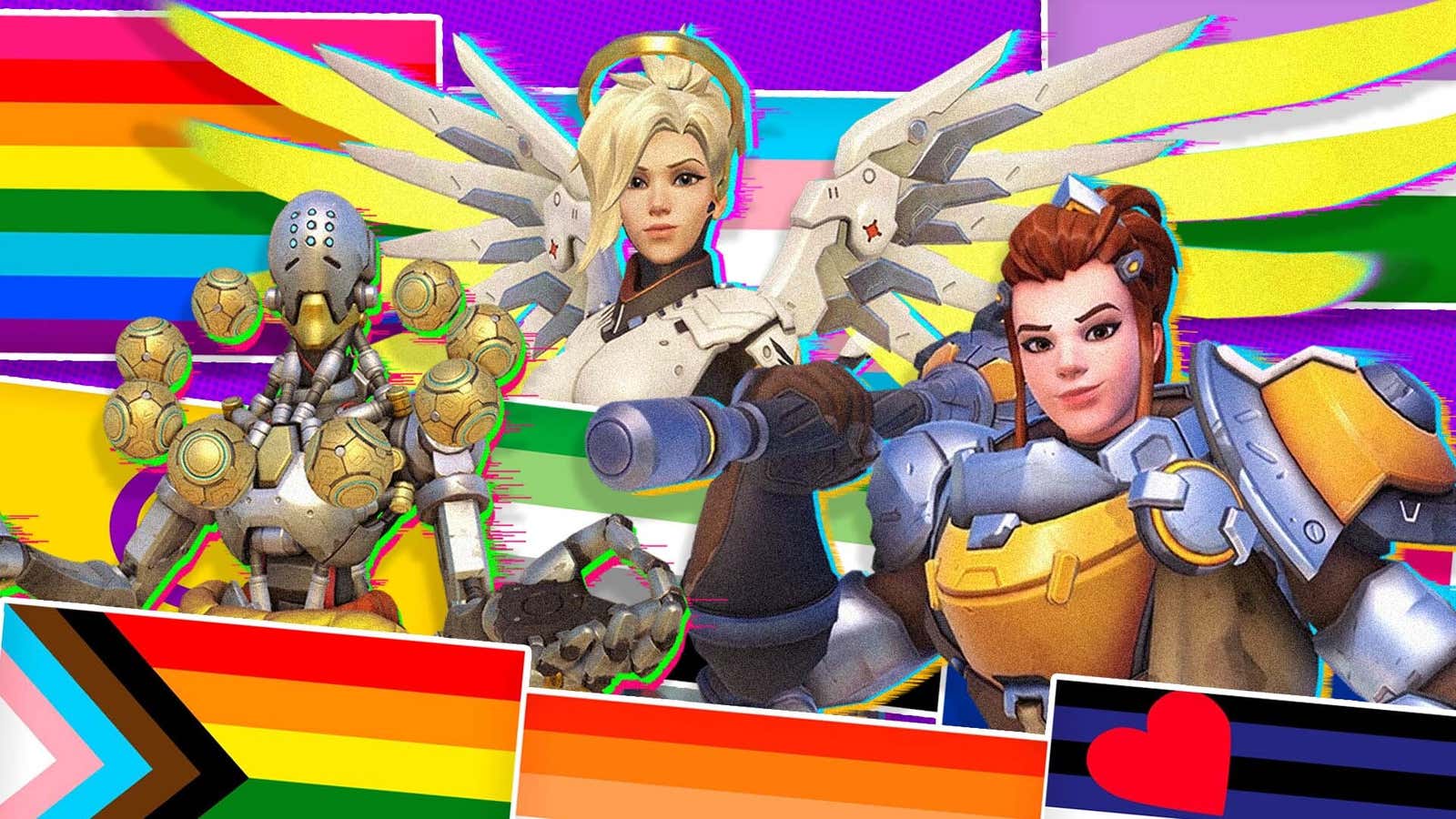There’s a phenomenon in the Overwatch community that has persisted through the original game’s 2016 release, its gradual decline, and the launch of the sequel. This phenomenon is an interesting one, a sort of “IYKYK” situation that requires membership in a specific community in order to recognize its members: in Overwatch, a lot of queer players choose to play as healers. Maybe you haven’t noticed this—maybe you’re straight (I’m sorry) and can’t spot an alphabet army soldier in your lobby, but if you’re in the LGBTQIA+ community and play Overwatch 2, you know exactly what I’m talking about.
Mercy mains with rainbow player icons, Moira one-tricks wearing her Bowie skin, two-stacks who instalock support with some iteration of “-ussy” in their gamertag—if you pay attention, you’ll see that the gays are everywhere in Overwatch, and most of the time they’re playing healer. And with Lifeweaver, a healer and also the first character introduced as queer from the jump, joining the fray in April, Overwatch healing has gotten even more gay.
But this is all anecdotal evidence, right? Surely gays don’t gravitate to playing healers that disproportionately, do they? After hundreds of hours logged in Overwatch 2 comp , most of which I played as a healer, I felt a burning desire to delve deeper into this phenomenon and figure out why I kept encountering fellow gays in the support role. I had my theories: queer people are used to supporting their found families in the real world, support roles are notoriously less toxic, many of the healer characters are femme or androgynous—but I needed more.
So, I put out a call for “gay people” on Twitter, I interviewed players and peers, and I spoke to a queer-identifying counselor, all in an attempt to properly investigate Overwatch’s gay healing agenda. The result is a fascinating look at a subculture within a subculture, one marked by real-world social queues, kink play, emotional connections, and, unfortunately, a frustrating lack of scientific research.
Gay icons
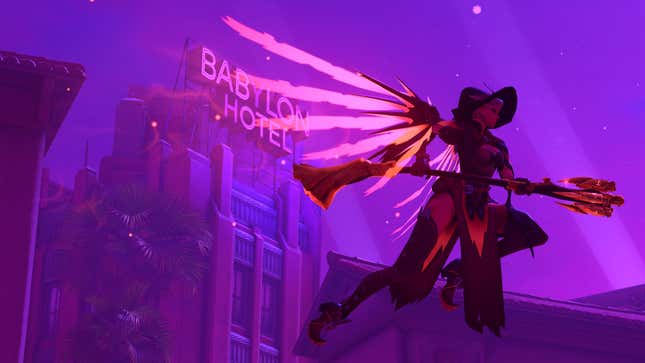
The most obvious answer (and one of the more common ones I received on Twitter) as to why queer people play healers in Overwatch is that the characters themselves are gay icons. Even though the only two openly queer characters are both DPS heroes, the lineup of support characters looks a lot like the line outside of Happyfun Hideaway on a Saturday night: the uber-feminine and soft Mercy, the muscular and bold Brigitte, the sweet but strong Baptiste, the spunky and sarcastic Kiriko, the calm and collected Zenyatta, the androgynous and tall Moira, the soothing and maturely sexy Ana. Compared to your typical FPS lineup, and even most of the other Overwatch characters (save for outliers like Zarya and Mei), the support squad in this game feels demonstrably queer.
Overwatch player and freelance writer Nico D. echoes this sentiment via email, saying the characters “are designed in such a way to be desirable to queer communities—Moira is a REALLY good example of this, but I also know a lot of queer women or other queer people who are attracted to women that love Mercy, Ana, and Brig.” Nico suggests this has to do with the futuristic, sci-fi fashions depicted in the game “that also happen to be on characters with typically queer-coded appearances like slightly more atypical body types/silhouettes/haircuts.”
That definitely describes most Overwatch support heroes. And though Mercy is slim and white and traditionally attractive (Blizzard does, after all, historically have a problem with portraying women’s bodies), she still doesn’t feel as aggressively sexualized as someone like Widowmaker, whose impossibly long legs and massive tits scream The Male Gaze everytime she runs (in heels) across the screen.
Others who identify as queer and play Overwatch predominantly as healers tell me that the support characters are “gay icons” whose presence/vibes suggest queerness even though it’s not outright stated. “They feel queer” is a sentiment that, while scientifically impossible to prove, is consistently echoed in both messages to me and Overwatch community spaces. But “feeling queer” is a helluva lot different than being canonically queer—so why doesn’t it seem like members of the community play Tracer and Soldier: 76 as much as they play healers?
Gender roles
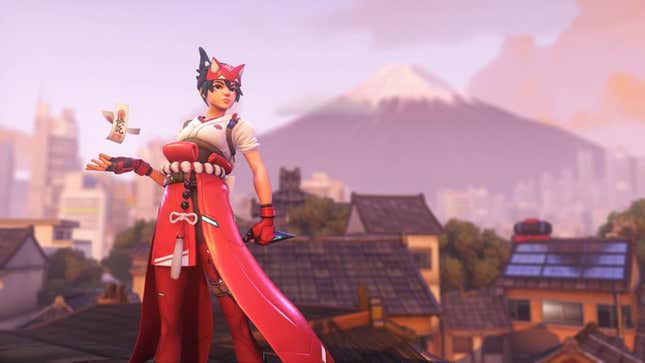
Venture into the Reddit or TikTok trenches in search of an answer as to why gay people play healers and you’ll likely stumble across the “I can’t aim” meme. Like many internet fables, this one is somewhat rooted in reality. Evie Mae Barber, writer and narrative designer, tells me via Twitter DM that when she played Overwatch, she mained Lucio and Mercy because she finds healers in FPS titles “require less precision and more strategy,” whereas the DPS characters’ effectiveness are largely rooted in accuracy.
A desire to avoid roles that require accuracy could be a side effect of traditional multiplayer FPS titles being largely unsafe spaces for women and non cis-het men—it’s hard to feel comfortable or competent in these roles when the skills you need to excel at them should have been honed in the dark and scary servers of Halo 3 or CS:GO, during a time when the mere hint of “otherness” was met with viciousness, slurs, and threats.
The boys’ club of FPS titles may not exist in such severity today as it did in the early 2000s, but its effects linger. “There was a meta-analysis done that had several results, specifically about Overwatch,” says Dr. Sarah Hays, a queer-identifying counselor at nonprofit org Game to Grow and director of programming at Queer Women of Esports, during a video call. “Of course, it was on a gender binary, but male esports competitors are seen as more competitive than female competitors. Female players believe support to be the easiest position to play and prefer to play it because they don’t want to be blamed for not doing well.” She pauses. “That meta study has a whole bunch of data. I just hate that it’s done on a gender binary.”
It’s clear that the lack of adequate research around LGBTQIA+ gamers and the roles they choose to inhabit in multiplayer titles frustrates Dr. Hays. “My plea is: ‘people, let’s do research on this because it’s so cool,’” she says earnestly before returning to the meta study, combing through it to try and find some more connections to the theory at hand: “Non male-identified people tend towards picking a character that they can feel confident in. So they reduce harassment and they reduce some of that input. ‘It’s easier to play support because I’m not getting as much shit, I’m not getting blamed for that.’ That’s something we’re seeing both based in research and generally: people want to look and appear and feel like they know what they’re doing, so they’re not going to receive flack for being another ignorant non-dude. Which sucks. But it’s true.”
Dr. Hays doesn’t say this word during our chat, but it lingers overhead: toxicity. “I think queer folks trend toward support as it feels like the least toxic role or at least one that has less toxicity associated with them,” says Threshold Games’ community manager Colin Cummings in a DM. So, part of the reason queer-identiying gamers may be choosing healers is to avoid the rampant toxicity that comes with playing competitive FPS games. But how much do real-world experiences outside of gaming tie into choosing the support role?
Support systems
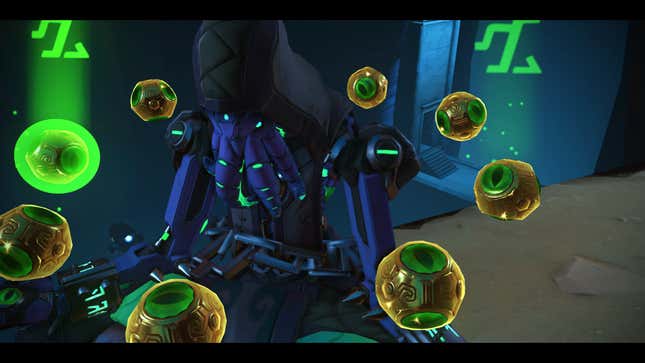
I’m pleased when one of my theories is echoed by a few fellow healers: queer people, so often forced to protect themselves because the government won’t protect them, so connected to found families made up of supportive friends, would naturally gravitate towards characters who provide safety and security.
“I don’t think that it’s a far stretch to imagine that the fantasy of support or healers is appealing to groups of people who require communities around them for safety and affection,” Nico writes.
When I mention my theory in a DM with Eric Ravenscraft, product writer and reviewer at Wired, he’s on board, too. “Honestly, that wouldn’t surprise me too much,” he writes. “Support is very much herding cats, keeping your precious babies alive while they’re getting chased down by a mean dude with a hammer…most of the LGBTQIA+ folks I know live in a very found-family kinda space that becomes very protective of outside threats. Every single person I know in that space knows what it’s like to protect their friends—or even randos—from a bigoted parent or institution or whathaveyou. That kinda mindset maps pretty cleanly onto keeping four randos you just met safe online.”
This social connection between support roles IRL and in Overwatch is something Dr. Hays “loves” during our chat—it clearly sparks her interest, and I can see her cogs turning on our video chat as she begins pondering the larger ramifications of this idea. “I wonder if there isn’t a correlation between oppressed identity and feeling better as a person in the position of healer, because it means that you get to avoid the blame, but also you get to be reinforced as someone who’s helpful and supportive, and more effective in that role? Yeah, because of the way that our real-life experiences have catered to that, as well.”
While Dr. Hays is clearly inspired by these ideas, she reiterates that there’s just not enough research about this kind of stuff to provide us with much concrete evidence. She does, however, bring up a scientific study that leaves my jaw on the floor.
Piss play
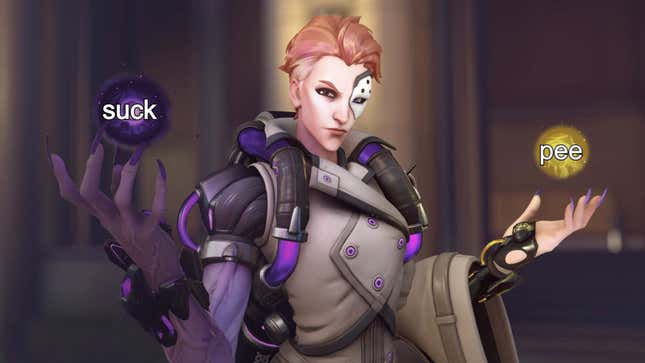
When I wrote about how Overwatch 2’s shorthand is a specific brand of twisted, the slang term for Moira’s healing (pee) was at the top of my mind. So when Dr. Hays starts talking about a scientific study about Overwatch’s “healsluts,” I am, as the kids say, gagged—the connections are there, drawn together by queer players who are, in fact, little freaks.
Assuming the role of a healslut, according to the study from Finnish academic journal Widerscreen, “[invites] players to deploy elements of BDSM kink and sexuality not merely within the vocabulary and design of the game, but also in a communal paratext surrounding the game involving forums, voice chat, and viral fan-designed images.” Kotaku already wrote about this kinky phenomenon almost eight years ago—a r/healslut moderator told writer Luke Winkie that healsluts take classic dominant and submissive roles that are synonymous with traditional BDSM and apply it to the roles laid out in Overwatch.
The tank (dom) protects and compliments the healers (subs), occasionally scolding them if they fail. Healsluts have one main duty, and it’s to protect their doms (DPS characters are considered darker, more violent versions of tanks, which makes sense if you’ve ever tried to pocket heal a Genji). Though much of the writing about this community was published several years ago, I can confirm that r/healsluts is still an active subreddit.
In many cases, the Venn diagram of kink and queer communities is a circle, with kink playing an important role in Pride events and in the history and legacy of LGBTQIA+ people. Kink play in Overwatch is a “a way for resisting ‘masculine-normative hegemonic fandom’ in video games,” according to the aforementioned study, and it persists even after Overwatch 1 was sunset in place of a free-to-play sequel.
So whether it’s because of cishet-y FPS pressure making support a more attractive role, social roles within found families that translate to games, the indefinable but still somewhat tangible queerness of the healer characters, or a preternatural need to heal big, dommy tanks, it’s very clear that there are a lot of LGBTQIA+ people playing support in Overwatch 2.
I could happily unpack this phenomenon in another 2,000 words, but maybe I should just leave it at what Kaitlin Jakola, managing editor at The Trace and former Gizmodo employee, had to say about it:
“I assume we all heal because gays love to be both extremely powerful and woefully unappreciated in our own time????” Work, bestie.
Update 06/22/2023 at 2:45 p.m. ET: Updated to include a line about the newer hero Lifeweaver.
